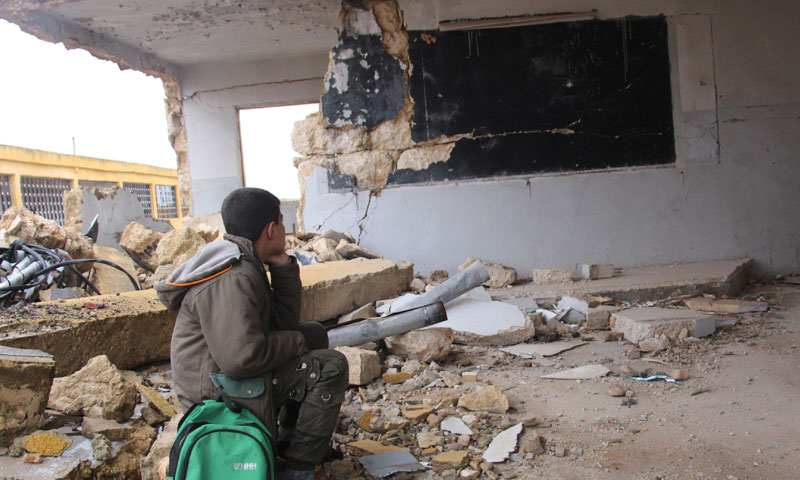



Even though education in north-western Syria managed to break of the dominance of the security and partisan institutions of the Syrian regime, it so far failed to achieve its financial independence, for security in the area is still in an alarming state and urgent humanitarian needs are many in the ninth year of the Syrian war.
In addition to this, the Western financial support was cut off for the Directorate of Education in Idlib and Aleppo, informed by the international Chemonics organization on September 20.
The termination of funding placed thousands of schools and teachers before difficult choices.
Although the European funding had previously provided only a salary of $120 to 65% of teachers in northern Syria, this support helped sustain the educational process that fought against the congestion and destruction, serving more than a million students in the area.
In northwestern Syria, teachers work in absolute freedom without any pressure exerted by the security services. They can guide their students educationally, ethically and practically without imposing any restrictions, the President of rural Aleppo Teacher’s Union, Omar Laila told Enab Baladi.
However, there is a set of challenges that prevent teachers from performing their duties during the war years. The most notable one is the weakness of the educational institutions.
The institutions have not been capable of meeting the practical teaching needs such as books, salaries, logistics, equipment and rehabilitation of schools.
One-third of schools in Syria was damaged or destroyed, while the remaining ones were used as shelters by the internally displaced persons, the United Nations (UN) reported.
As a result of airstrikes and shelling, 60 schools have been damaged or destroyed in northwestern Syria since late April, and 94 schools have been used as shelters by the displaced, according to statistics issued by the UN Office for the Coordination of Humanitarian Affairs (OCHA) on September 20
Another important challenge that constrains teachers from performing their duties properly is the constant forced displacement and evacuation from one area to another, Omar Laila said.
Moreover, teachers lack stable financial resources, and education organizations have not set uniform criteria for hiring teachers.
The President of the Teachers’ Union, Omar Laila stressed that teachers work on a voluntary basis in most areas.
Receiving grants only for a short period from some organizations, the average salary of a teacher remained at $ 80, if earned, with salary cuts in the summer, while the cost of living has risen to $ 500.
In a previous interview with Enab Baladi, the Director of Al-Maarifa high school in the southern countryside of Idlib, Qutaiba al-Haroush, stated that the low income of teachers “pushed a lot of competent ones to work in non-educational fields […] which negatively affected the educational performance and process.”
The recent cust imposed on funding have affected 4,400 teachers in 550 schools which offer services for more than 160 thousand students in the second stage of basic education and high schools, despite some donors’ pledges to continue funding till the end of the current school year, as the Deputy Head of Education Directorate, Mohammed al Hussein, mentioned to Enab Baladi.
Al-Hussein pointed out that Directorate has not prepared contingency plans to compensate for the shortage.
Since its foundation, the Education Directorate has been providing the needs of the education sector through voluntary work. Al-Hussein stressed that volunteering is “not a solution for the education crisis,” because the teachers must look for other sources of livelihood.
Dr. Huda al-Absi, the Minister of Education in the Syrian Interim Government, has been working on finding solutions to the problems of education in the countrysides of Idlib and Aleppo since she assumed the post on August 31.
However, her work has been hampered by the Syrian Interim Government’s weak and limited powers, while both the Syrian Salvation Government and the Turkish authority are sidelining it in the northern countryside of Aleppo.
Speaking to Enab Baladi, al-Absi said that the educational situation in the area is an “open secret”, noting that the number of students threatened with dropping out of schools exceeds one million and 120 thousand students as a result of funding cutoffs and the prevailing security situation and displacement.
The Education Ministry held intensive meetings with donors from countries and organizations interested in supporting education to fill the deficit. Some made promises of providing them with aids while others refuse to deal with the Syrian Interim Government as a political body, tending to support the Directorates of Educations.
Al-Absi indicated that the Ministry of Education is working to establish an education platform that consists of all organizations interested in providing support in order to ensure collaboration and coordination amongst them.
“Unfortunately, there is a war being waged against education and all means of life in our area,” said al-Absi, drawing attention to the many difficulties facing the education sector in the last area controlled by the Syrian opposition.
On the other hand, the Head of the Education Directorate in Aleppo, Mohammad Mustafa told Enab Baladi that the directorate, for its part, has cut the administrative positions in schools by half . At the same time the directorate is maintaining the minimum required to run schools since the subsidization for education sector was stopped.
The Directorate applied the standards of the school map that defined the lower and upper limits of grades in a school. This resulted in a decrease in the number of classrooms and a matching decrease in the staffers’ number.
Mustafa added that the Directorate is ‘optimistic’ about the procedures mentioned above that will enable the directorate to provide services and support for most or all schools this year.
He pointed out that the cut off support for educational projects is not new and with ending support for some projects, funds will be provided for others. Still, the deficit rate for this year is higher compared to the previous one.
if you think the article contain wrong information or you have additional details Send Correction